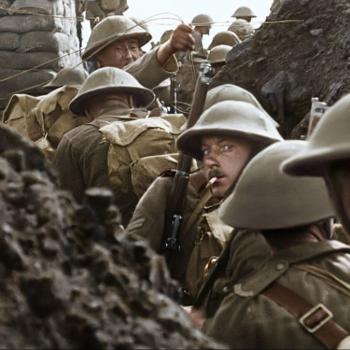Homer’s Iliad is a profound religious work; while it was written by a pagan, the issues he brought up continue to be ones which Christian theologians throughout the ages try to find answers to. According to Balthasar, “The real theme of the poet of the Iliad is the divinity caught between the prayers of men, rent apart by the tragic contradictions of the world (this division is expressed in the personal relationships of the individual gods to their protégés and their quarrels against each other) and at the same time raised above the contradiction, keeping it under control by inscrutable decree.” (Hans Urs von Balthasar, The Glory of the Lord IV: The Realm of Metaphysics in Antiquity. Trans. Brian McNeil, Andrew Louth, John Saward, Rowan Williams and Oliver Davies. Ed. John Riches (San Francisco: Ignatius, 1989), 63). How should God react to humanity when humanity, divided against itself, selfishly seeks God’s blessings upon that division and to aid one side of humanity over and against another? Indeed, as Joy Davidman points out, all too often, not only do we seek God’s blessings to be upon us, we seek God to defend us in all our beliefs and actions, even if they oppose God’s will; we want God to defend our idols:
Our earthly loves and joys are meant to lead us to Christ, and we must certainly ask the Christ in whom we believe to preserve them for us. Yet this is very different from using Christ without believing in him — from making Christian doctrine into a propaganda weapon, a pep talk to hearten us to go out and fight for good old materialism. We must return to Christianity in order to preserve the things we value — but we cannot return to Christianity at all unless the thing we value above all else is Christ. If we are reviving religion only in order to defend our own works, from the American Constitution down to the famous American blueberry pie, we are in effect asking Christ to save our idols for us.
— Joy Davidman, Smoke On the Mountain (Philadelphia: The Westminster Press, 1985), 36-37.
While for Homer, it was Zeus who was asked to defend and protect all the different, divided nations, because it was his decrees which mattered, his decrees which had to be followed, in the end the question is the same today as it was for Homer: how and why does God choose to benefit one group of humanity over another, especially if both sides are invoking him for their benefit? One can argue that this question remains in the background of Wolfgang Petersen’s Troy.
However, by the fact that the gods are no longer active participants in the Trojan War, and often their central place in the film are as idols created to receive the brutal hostility and scorn of Brad Pitt’s Achilles, the question has changed. No longer is it how does God decide, by why does God sit still doing nothing, why does God remain inactive when humanity fights against itself? How can God fail to take sides? In this way, Homer’s story featuring a pious questioning of the gods has been transformed into an epic emphasizing the nihilism of our culture. With this emphasis, is Petersen making an clear, unequivocal criticism of God, or is he, perhaps, making a subtle criticism of our own cultural bias? Arguments can be made for either position. And perhaps, that too, might have been what he wanted.
It is clear that the Trojans, as a whole, end up having nobler, purer hearts than the Greeks. Certainly they are not perfect, and the war was a result of Paris’ sin, and it is their pride which brings about the fall of Troy. But, the goodness of Hector and Priam far exceed anything we see within the Greeks. And the Trojans as a whole stick together; they care for each other more than the Greeks do for fellow Greeks. Despite their faults, we can feel sympathy for them. And if this is the case, how could Troy fall? What justice is there in this? How could they not get the blessing of divinity?
The Greeks are masters of war and terror, and they are led into it by Agamemnon’s desperate quest to dominate the world. Achilles and his men represent the best of the Greeks, and yet he seems to fall more as a nihilistic hero after the works of Robert E. Howard than he does a Greek. He has no regard for kings, for the gods, for anyone who would lay any claim over him, unless it is a claim of the heart. He honors and respects bravery, and can tell and appreciate nobility in kings when he sees it (as with Priam), but he is his own man, and he will not follow orders which take him away from his desires, central of which is to have his name preserved throughout history by feats of heroic glory. Fame, he thinks, is all that really matters. It is here that the connection of Achilles with modern ideals combines very well with the Homeric Achilles, because the two here are one: and in that unity, both come to see beyond the illusion of fame, and, in the end, want nothing of it. “The whole thing hinges on the glorification of Achilles, which he willingly purchases at the price of his early death; indeed, in the very moment in which Achilles’ dream is completely fulfilled, the honour is of no further use to him for his Patroclus is dead.” (Hans Urs von Balthasar, Glory of the Lord IV, 66). Petersen portrays the wrath of Achilles very well, but more importantly, he rightfully shows the transformation that his wrath creates within the hero; he learns that his fame is at the cost of his heart, that his glory that he was promised was to come at too great a price, that of the death of his young cousin. And through Priam he understands that his grief, his anger, his wrath, is the grief, anger and wrath all face in the heart of war; brothers and sisters, wives and husbands, children and elderly are sacrificed at the altar of Ares for such a shallow reward.
http://youtube.com/watch?v=NgaCP9EgSqUWhen Troy was released at the theatre, what I had heard about it disappointed me; the reviews were lackluster, to say the least. While I understood the point of doing the Iliad as history, I wanted (and still want) a faithful rendition of Homer in all of its pagan glory. When The Director’s Cut of Troy was released, many reviewers still felt something was lacking in the film, but they did point out that it was far more realistic, far bloodier, and filled with far more gravitas than what was released at the theatre. They also pointed out that many of the characters were far more fleshed out, making for a far better story than what was told in its original release. Since I never saw its original cut, I cannot compare the two, but I can say I felt the movie, for the most part, was quite good. It tries to balance itself out between story and action. Moreover, unlike many movies, when war is being waged, when fights are breaking out, one can follow what is going on in the screen. That I think helps the film; Petersen relies upon the camera to show what is going on and lets us see it, instead of leaving us confused as most directorial fads do.
The violence might be slightly over-the-top, and battle victories (except when heroes fight each other) are won a bit easier than would normally happen. But this is to be expected. And so is the gore: there is quite a bit of blood being shed, making this a movie that the squeamish might want to avoid. Yet, it is necessary, and not gratuitous. That cannot be said for the nudity; while it is understandable that the heroes will sleep around with the local populace, Petersen could have covered them up on screen instead of letting them lie naked on the ground.
There is much to like about this film. The main actors are top notch. The direction is superb. The budget allowed for the production of great sets and realistic looking armies. It is long – very long, but it is needed to get to the depth of the story which is behind the fall of Troy. But there are certainly quibbles I could also make about it. Its greatest failure was its end: the sacking of Troy seemed anticlimactic. Unless I missed her, Cassandra was not in sight. Aeneas, while shown, was unconvincing. But these are minor issues; clearly the fall had had to be shown, but the emphasis here was with the Iliad and not the Aeneid.
3 out of 4 stars.












